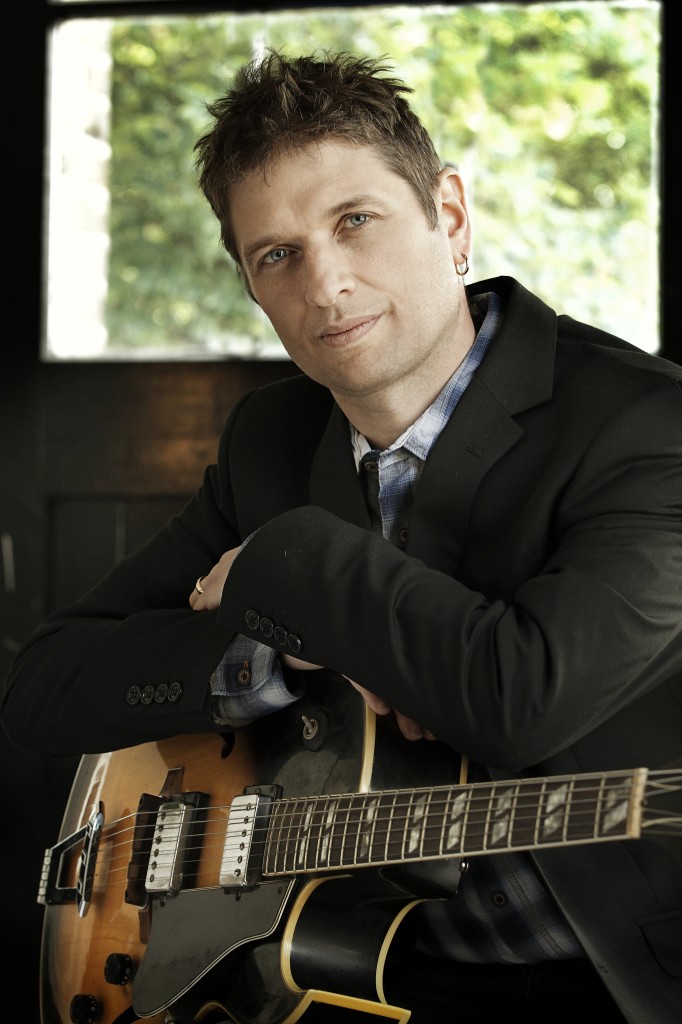LATEST NEWS
Welcome
Milton Mermikides is a composer, lecturer, writer, academic, producer, electronic musician, illustrator and guitarist from London, UK. He also is embarrassed to talk about himself in the 3rd person, but he’s already started now so here we are.
He is the 37th Gresham Professor of Music, Professor of Music at University of Surrey, Professor of Jazz Guitar at the Royal College of Music, Professor of Research at the Guildhall School of Music & Drama, Senior Research Fellow and Composer in Residence at the Centre of Eudaimonia and Human Flourishing (Linacre College, Oxford University), an Ableton Certified Trainer, and Deputy Director of the International Guitar Research Centre.
A full CV, overview of research/compositional areas, learning resources, contact enquiries and latest news are all available here, menus and search bars should help with all else. Wikipedia
Here’s a summary of my musical philosophy, not mine but I humbly endorse this:
Milton Mermikides is a composer, guitarist, and academic whose musical approach is defined by a deep engagement with interdisciplinarity, blending genres, and innovative methodologies. Rooted in jazz, classical, and electronic traditions, his work often bridges the gap between seemingly disparate fields, from data sonification to traditional composition.
Key aspects of his philosophy include:
- Interdisciplinary Exploration: Mermikides is passionate about using music as a tool to explore connections between art, science, and technology. His work in data sonification exemplifies this, translating scientific and mathematical data into musical forms that are both informative and aesthetically engaging.
- Innovative Storytelling: His compositions frequently tell stories or convey concepts that extend beyond traditional music-making, incorporating narrative, visual elements, and interactivity. This reflects his belief in music as a multidimensional medium for communication.
- Inclusivity Across Styles: He values musical inclusivity, moving fluidly between genres like jazz, classical, and electronic music. This openness is rooted in a belief that all styles offer unique perspectives and tools for expression.
- Educational Impact: As an educator, Mermikides focuses on making music theory and practice accessible and inspiring. He employs innovative teaching methods, often drawing from his own research and performance experiences, to encourage creativity and critical thinking in students.
- Humor and Humanity: His work frequently incorporates a sense of humor and human connection, aiming to make even the most complex ideas resonate on an emotional level.
Overall, Mermikides’s musical philosophy combines technical rigor, creative experimentation, and a commitment to engaging diverse audiences in meaningful ways.
Qualifications:
PhD (Composition) from University of Surrey
BMus (Performance & Composition) from Berklee College of Music
BSc (Analytical & Descriptive Economics) from London School of Economics
Disqualifications:
Judged the final of the 2006 World Air Guitar Championships
Attempted to open front door with an Oyster card.
Still really needs to fix that drawer


23 replies on “Welcome”
Thanks for taking the time to write your “Hertz so Good” article. It has helped shutting up a few conspiracy nuts on my facebook feed.
Also, many other interesting reads on your site. Keep up the good work!
The funny thing about 432hz imo is that if its a semitone with a slight off bit in terms of cents one could as easy tune 440 that same amount and get the same effect. Its a pointreference. The 432 advocates like the tuning origo to be slightly off ab, and they would still be playing slightly off A440. 🙂
Ty for the good read! The comment section was the funny part! 🙂
And since the sun is a growing object we would need to calibrate the 342 accordingly! 🙂
Hi from Cambridge . I was thinking about a harmony flow chart yesterday and woke up and found yours. My thought included a timeline to show which composers favored certain patterns, like Fritz Loewe’s propensity for leaving his bridges on III#5 (If Ever I Would
leave You, How to Handle a Woman, On the Street Where You Live). Or how historically we move from drones to atonality but now we’ve come full circle in serious Western music with prizewinning pieces that are completely tonal. Thanks for your inspiration
That would be awesome. Music history is nothing like that convenient linear expansion of ‘complexity’ but it would make for a fascinating exercise. (Check out Hook Tools for a valiant effort with pop music). I will do my bit given time.
I know it is an old comment, but I swallowed the hook and went on searching for “hook tools”. All I found were weird DIY wall drills. What am I missing?
Here you go: https://www.hooktheory.com
Good morning sir,
I have discover your Tintinnabulator. I am a real fan of Arvo Part but I don’t know how to use it on my PC(windows). Would you help me ? Must I have an apply or something else to read it ?
Thanks for helping me,
Gwenaël
Hello, I came across your wonderful lecture on Arvo Part initially so have been exploring further your videos. I just watched your TED talk. I like your sense of experimentation and attitude that music pervades everything and everything can be the inspiration for music. This past year I have been making rubbings of tree bark and converting the markings into notation. To date I have made rubbings of 7 trees, including two different cherry trees, and after initially transcribing the pieces for a small ensemble I recently orchestrated and compiled them together. The thought occurred to me that we can identify trees from their leaves, their fruit and bark so why not from rubbings of the bark’s texture. If you are interested these pieces can be heard on my YT channel.
Kind regards
Andrew
Hi,
https://www.youtube.com/watch?v=1XTrfLc7xbA so great! the Porgy and Bess at 23:26 min in you demonstrate using the Melo Rhythmic divorce 1.1. What software did you use to create this? Ive been working with the Schillinger tonal expansions with amazing results and want to test these ideas at the next level. Melody Rhythm dynamics and instrumentation.
Cheers!
David
Greetings from Mexico. I really enjoyed your article on Allan Hodsworth.
Thank you very much for your article
Gracias! Much appreciated!
Good day, Milton.
I came across your work through your wife. I recently viewed her YouTube video on the “Moonlight Sonata”. The arrangement and performance is very excellent and her work made me feel this piece was accessible for me to play.
I now own her book on the that transcription, as of today. I hope to add that and other pieces to my repertoire.
When I viewed the acknowledgement page, I notice your name and thought, “Is this a husband and wife musical duo?”. I then found your website and YouTube page and was blown away by your work as well.
You two are indeed a dynamic duo and I am benefitting greatly from both of your work.
I look forward to continuing to glean from your creating partnership.
Greatest of wishes to you and your family,
Jason
I am LOVING The Nature of Music series of Gresham 2023 Lectures. I’ve never heard such a huge range of musical examples from all over the world brought together in a single forum to illustrate the how, what and why of music. It’s absolutely brilliant. The presentation of difficult concepts is so very well done. Thank you. Very much looking forward to No. 3 in the series.
Your “The Art and Science of Tuning” available on YT is awesome !
Thank you for sharing with us such knowledge and deep love of music.
Thank you so much!
Greetings. I would like to ask when the book Hidden Music – The Composer’s Guide to Sonification will be available. I
Hi Milton.
My name is Graeme. I’m a PhD student in Cybernetics at the ANU in Canberra, Australia. (Currently on hiatus.) I am also an autodidactic guitarist… hell… I am autodidactic in most of the domains where I am considered to have some kind of knowledge or expertise… generally a sophisticated form of philosophical and cybernetic omphaloskepsis. 😀
Anyway… I saw your Gresham lectures recently. Fantastic. You have reinvigorated my interest in music theory. Brilliant lectures. A survey, certainly, but some of the deeper principles and mathematical patterns are clearly non-trivial… really fascinating stuff.
Also, and FWIW, I found this yesterday and immediately thought of your explanations of the harmonic series… you might find this interesting.
https://www.youtube.com/watch?v=RCIz2hdJQy0
regards,
Graeme.
p.s. I also shared your lectures with a friend who is am musician and his response was much the same as mine. Great work!
p.p.s – in the video… abstract away the maths, the complexity… consider the floating point of particular elasticity… it is very much like the wanderying barycenter of tonal gravity that classical pursues and jazz improvisationally inhabits.
I was blown away by your recent Gresham talk on the Beatles, at least by those parts I understood! I appreciate all the hard work that went into producing your slides.
I first realised the Beatles would change the world when walking past an open window in Vallance Road (Kray territory) in the early sixties and hearing their first LP. So I should have felt vindicated when they simultaneously had the Top 5 Billboard records in the US, but I have never forgiven the Americans for ignoring I Saw Her Standing There, their best record to date in my opinion.
However, I would like to query your idea that the Beatles knew what they were doing, in other words they had explicit knowledge of musical theory as laid out in you talk. I think musical composition is largely transcriptional or subconscious, based on musical hallucinations generated from a hypersensitive cochlea. Evidence:
1. See my many publications, eg Neurology 1994;44:986.
2. PM’s hallucination of Yesterday.
3. There was an epidemic of classical composition in 19th C Europe in capital cities visited by Napoleon’s troops. Dissolute musically trained young men caught syphilis which in its early stages hypercharges the ears and induces musical hallucinations.
4. Delius’s views on this topic.
5. Brian Wilson had damaged ears and hallucinated Pet Sounds.
6. Composers had a far greater incidence of ear disease than would be expected, and not just Beethoven.
I am totally unmusical, but as scientist I always start with Occam’s Razor, and go for the simple (or naïve!) explanation first. I think the crucial factor in the Beatles’ eminence is their excessive exposure to loud music and disturbed biorhythms in Hamburg, which jazzed up their ears.
Thank you for your fantastic lectures for Gresham at St Luke’s. Your “Magical Mystery Tour” described the brilliance of the The Beatles which I had not been able to articulate. It was great to have attended that lecture.
What music are you going to introduce us to in your next Gresham lecture?
When you introduced that Schubert loop which goes Dm-F-Am-C-Cm-Eb-Gm-Bb-Dm, I was compelled to go away and build my own piece around it. When you covered “Vers le Blanc” I wrote custom software to reproduce it. I then went back to Schubert, and rewrote my code, so I could pitch bend the whole thing. (Luckily I had already used tintinnabuli to put a bass line to my fibonacci-generated composition, so no time spent there!)
Any clue on what music/software/thing you’ll tempt me into building would help, so I can get a head start! 🙂
Thanks for engaging. Sounds like amazing work. This year we’re looking at intersections of music and natural world. Hopefully some beautiful things! You might want to check out Dillon Barton’s ‘inspired by nature’ suite of devices…
Thank you – I shall look into Dillon Barton’s work in preparation of building something myself, based upon your lecture(s)!